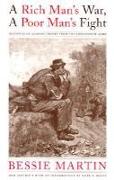A Rich Man's War, a Poor Man's Fight
BücherAngebote / Angebote:
This book argues that Confederate soldiers left their posts in significant numbers due largely to the prevalence of poverty on the home front. At the start of the Civil War in 1861, many men in Alabama enthusiastically enlisted. After these husbands, fathers, and brothers--all family breadwinners--marched off to duty, the number of indigent families in the state began to rise dramatically. Inflation, lack of transportation, a drastically decreased labor force, war taxes, and enemy invasion all created an increasingly desperate economic situation, especially in less affluent northern and southeastern sections of the state. In some places, women and children were reported to be near starvation, bread riots erupted, and begging was common. As soldiers became more and more distressed about these developments at home, waves of desertions occurred. Even social relief efforts made by state and local governments in the form of the Military Aid Society, the Samaritan Society, and the Citizen's Relief Association did little to deter the cyclical exodus of fighting men from Confederate units. Southern leaders considered desertion the chief cause of serious military defeats, including those at Atlanta and Gettysburg. Desertions certainly weakened the manpower of the Confederacy and lowered the morale of its people. Bessie Martin's well-researched study sheds light on the complex nature of desertions by Alabama troops and provides valuable statistical and bibliographic information for contemporary researchers. It will be welcomed anew by Civil War historians and enthusiasts.
Folgt in ca. 15 Arbeitstagen




